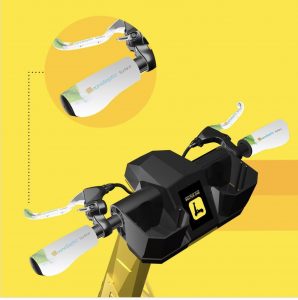At the Speed of Light

We have all heard of Usain Bolt being the amazing Track Olympian sports world, but he is also a man of many talents. He co-founded the mobility company Bolt mobility in July 2018. The startup focuses on designing technology for electric scooters, bikes, and mopeds. Bolt mobility operates in 150 cities and 35 countries.
This week, they reintroduced their Bolt One model composed of swappable batteries with 25 miles range and equipped with front-facing footrests in Portland. The novelty? They equipped the handlebars with the NanoSeptic technology. NanoSeptic is powered by light and is continuously self-cleaning surfaces without using any toxic materials.
“That’s why earlier this month we redeployed our scooters in Miami and New York City with NanoSeptic handlebars that continually self-disinfect, helping prevent our scooters’ primary touchpoint from spreading germs between riders – at a time when preventing the spread of germs can help save lives. “
Julia Steyn, CEO at Bolt Mobility
Paris Slows Down
The speed on the Parisian Périphérique, a 22 mile-long ring road connecting each district of the French capital city, is limited to 70km/h since 2014. It is way too fast for Anne Hidalgo, the current Paris’ Mayor, who presented a “Manifesto for Paris” in the context of the 2020 municipal elections. She plans to rethink mobility in the city, starting with a new limit of 50km/h speed on the Périphérique.
The Socialist Mayor puts ecology at the heart of her campaign by proposing a bunch of several new environmental policies. Among them, a 30km/h speed limit inside the capital city, less parking spaces for cars, and 100 000 newly planted trees. Besides, the temporary cycle lanes and pedestrian streets implemented during the coronavirus crisis would be made permanent.
The MIT Project
The MIT recently developed a quite impressive autonomous bicycle prototype. Designed for on-demand mobility, you simply have to call for a bicycle through an app, and it drives autonomously to you. Like a regular bike, you can ride to your destination and notify the app once your trip is complete. The smart bike will then autonomously join the next user, or go to a charging station if needed. To drive autonomously, the bike switch from 2 to 3 wheelers.
New Madrid Bonus
The city of Madrid aims to reach zero-emission goals for all vehicles that circulate inside the capital city. The Minister of the Environment announced a new subsidy for buying non-polluting vehicles at the beginning of the month.
The financial help equals 50% of the vehicle’s price with limits sets according to the nature of the vehicle. The subsidy is for now set at 150€ for electric scooters, 500€ for bicycles and 750€ for mopeds.
All details about this financial help should be available at the end of August.
A Smart Partnership
Swiftmile is an electric charging station company present in 78 countries. The charging stations are accessible to all operators for the moment, but Swiftmile will then serve its customers only. They recently announced a strategic partnership with Tortoise, a software company. Tortoise is developing a technology that will permit to relocate scooters and bikes to Swiftmile stations where riders need them, or when the vehicles need to be recharged.




